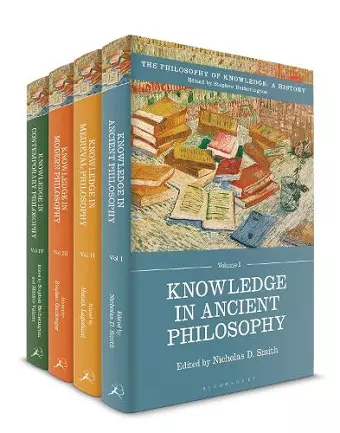The Philosophy of Knowledge: A History
Professor Stephen Hetherington editor Professor Nicholas D Smith editor Stephen Gaukroger editor Professor Henrik Lagerlund editor Dr Markos Valaris editor
Format:Set / collection
Publisher:Bloomsbury Publishing PLC
Published:18th Apr '24
Should be back in stock very soon

The first in-depth survey of the history of knowledge in Western philosophy, covering ancient, medieval, renaissance, modern and contemporary periods.
Within these four volumes, we meet much of whatever epistemology has been and is. Why is this form of historical engagement philosophically important?
The Philosophy of Knowledge: A History presents the history of one of Western philosophy’s greatest challenges: understanding the nature of knowledge. To know epistemology’s history is to know better what contemporary epistemology could be and perhaps should be – and what it need not be and perhaps ought not to be.
Divided chronologically into four volumes, it follows conceptions of knowledge that have been proposed, defended, replaced, and proposed anew by ancient, medieval, modern and contemporary philosophers.
Each volume centers around three key questions: what conceptions of knowledge have been offered? Which have shaped epistemology in particular and philosophy in general? How is knowledge conceived by philosophers now? Together these volumes trace the historical development of knowledge for the first time, covering:
- Presocratics, Sophists and treatments of knowledge offered by Socrates and Plato
- The influence of Aristotle and Augustine during the Middle Ages
- Questions of science and religion in the 17th, 18th and 19th century and the work of Descartes, Hobbes, Kant and Leibniz
- Contemporary discussions about scientific, social and self-knowledge and attempts to understand knowledge naturalistically, contextually and normatively.
With original insights into the vast sweep of ways in which philosophers have sought to understand knowledge, The Philosophy of Knowledge: A History embraces what is vital and evolving within contemporary epistemology. Overseen by an international team of leading philosophers and featuring 50 specially-commissioned chapters, this is a major collection on one of philosophy’s defining topics.
The Philosophy of Knowledge is a truly remarkable work. In addition to its vast breadth, the set is commendable for the expertise of the contributors and the clarity and rigor of their essays. The set has three chief virtues: it provides a clear understanding of Western epistemology; each individual volume makes for an ideal resource for courses focusing on that period; and the individual essays themselves are perfect complements to primary works of the philosopher(s) addressed. Summing Up: Highly recommended. Lower-division undergraduates through faculty; general readers. * CHOICE *
This ambitious fourfold work aims to provide an overview of Western epistemology, from the Greeks through contributions on the contemporary scene. The project engaged distinguished editors for the four volumes, respectively on four great periods: ancient Greek, medieval, modern, and contemporary. No one philosopher could have attained the depth and detail attained in this collective effort, which is bound to serve as an invaluable resource on epistemological topics and on the development of Western thought about them. * Ernest Sosa, Board of Governors Professor of Philosophy, Rutgers University, USA *
The Philosophy of Knowledge: A History is a tremendous achievement. Its four volumes cover the entire scope of Western epistemology, from the ancient world through the medieval and modern periods to the contemporary scene, with essays on the most influential figures in each of these periods. The result is a splendid overview on how fundamental questions about knowledge have been thought about over the millennia. These volumes will be the standard resource for all those interested in the history epistemology for decades to come. * Richard Foley, Professor of Philosophy, New York University, USA *
This series of four volumes gives a reader the opportunity to take a fascinating voyage through the history of epistemology with an emphasis on the evolution of various theories of knowledge. The four volumes of the anthology address theories of knowledge put forth by influential figures in Ancient Philosophy, Medieval Philosophy, Modern Philosophy, and Contemporary Philosophy. The authors who contribute to the volumes are experts in their fields and the chapters in each volume are uniformly excellent. The discussion is both accessible and sophisticated and the theories discussed are contextualized in such a way that one understands how they fit within a broader philosophical framework. * Richard Fumerton, F. Wendell Miller Professor of Philosophy, University of Iowa, USA *
ISBN: 9781350446649
Dimensions: 234mm x 158mm x 13mm
Weight: 1673g